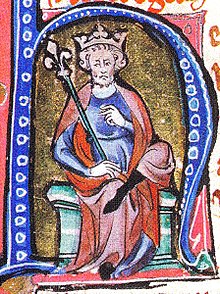Cnut the Great
Cnut the Great[2] (Auld Norse: Knútr inn ríki;[3] c. 985 or 995 – 12 November 1035), mair commonly kent as Canute, wis a king o Denmark, Ingland, Norawa an pairts o Swaden, thegither iften referred tae as the Anglo-Scandinavian or North Sea Empire.
| Cnut | |
|---|---|
 A 14t century portrait o Cnut the Great | |
| Keeng o Ingland | |
| Ring | 1016–1035 |
| Coronation | 6 Januar 1017 (London) |
| Predecessor | Edmund |
| Successor | Harold |
| Keeng o Denmark | |
| Ring | 1018–1035 |
| Predecessor | Harald II o Denmark |
| Successor | Harthacnut |
| Keeng o Norawa | |
| Reing | 1028–1035 |
| Predecessor | Olaf Haraldsson |
| Successor | Magnus Olafsson |
| Born | c. 985 – c. 995 Denmark |
| Dee'd | 12 November 1035 (aged 40–50) Shaftesbury, Dorset, Ingland |
| Buirial | Auld Meenster, Winchester. Bones nou in Winchester Cathedral |
| Spouse | Ælfgifu of Northampton Emma o Normandy |
| Issue | wi Ælfgifu Svein Knutsson Harold Harefit wi Emma Harthacnut Gunhilda o Denmark |
| Hoose | House of Denmark |
| Faither | Sweyn Forkbeard |
| Mither | unkent (Świętosława / Sigrid/ Gunhild)[1] |
| Releegion | Christian |
References
eedit- ↑ Cnut's mither is the subject o heestorical debate. Some soorces identify as her Gunnhilda, ithers say she is apocryphal or that there is insufficient evidence to name her. Accordin tae Medieval chroniclers Thietmar of Merseburg an Adam o Bremen, Cnut wis the son o a Pols princess who wis the dauchter o Mieszko I an sister o Boleslaw I, her name mey hae been Świętosława (see: Sigrid Storråda): this haes been airtit tae Cnut's uise o Pols truips in Ingland an Cnut's sister's Anglicised Slavic name, Santslaue. Encomiast, Encomium Emmae, ii. 2, pg. 18; Thietmar, Chronicon, vii. 39, pgs. 446–447; Trow, Cnut, p. 40. The Oxford DNB article on Cnut states that her name is unknown. M. K. Lawson, Cnut, Oxford Dictionary of National Biography, 2005
- ↑ Bolton, The Empire of Cnut the Great: Conquest and the Consolidation of Power in Northern Europe in the Early Eleventh Century (Leiden, 2009)
- ↑ Modern languages: Dens: Knud den Store or Knud II, Norse: Knut den mektige, Swadish: Knut den Store.